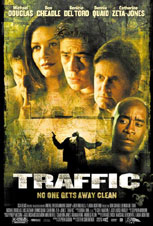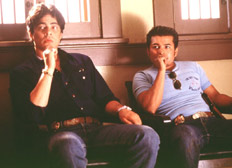| Traffic |
| |
 |
USA, 2000. Rated R. 147 minutes.
Cast:
Michael Douglas, Benicio Del Toro, Catherine Zeta-Jones, Don Cheadle,
Dennis Quaid, Clifton Collins Jr., Luis Guzman, Steven Bauer, Benjamin
Bratt, Miguel Ferrer, Jsu Garcia, James Brolin, Albert Finney, Topher
Grace, Erika Christensen, Amy Irving, Jacob Vargas
Writer: Stephen Gaghan, based on the miniseries Traffik
by Simon Moore
Music: Cliff Martinez
Cinematographer: Steven Soderbergh (as Peter Andrews)
Producers: Laura Bickford, Marshall Herskovitz, Edward Zwick
Director: Steven Soderbergh
LINKS
|
Note: The following commentary contains spoilers.
 et
me first mention what Traffic is not. It's not a message movie. It's
not a sermon, nor does it expressly take a side in the issues it examines. It's
also not a cynical film. Though it presents a dismaying world of internecine
battles, Traffic finds rays of hope in pockets. It's not for lack of
caring that the United States is losing the War of on Drugs, but lack of perspective.
The news media sell an easily digestible synopsis of the problem to the public,
and the politicians sell us a quick-fix solution. If it can be explained in
catch phrases and five-point plans, the reasoning goes, the drug problem assumes
an aura of manageability. It ceases to be an issue that bleeds into the choices
we make every day, and instead becomes an isolated project for Super-cops and
Czars, Task Forces and Oversight Committees. What Traffic achieves, and
what makes it a great, landmark film is that it acknowledges our culpability
and how at odds we are with the avowed intent to eradicate drugs. Our society
creates this problem with its insatiable demand for drugs, be they heroin, alcohol,
tobacco, or diet pills. We love the stuff, and refusing to look ourselves in
the eye short-circuits any plans to attack the side effects. One should ask,
after viewing the film, if the side effects should be attacked at all, or if
efforts are better spent treating the necessary ills that accompany our thirsts.
et
me first mention what Traffic is not. It's not a message movie. It's
not a sermon, nor does it expressly take a side in the issues it examines. It's
also not a cynical film. Though it presents a dismaying world of internecine
battles, Traffic finds rays of hope in pockets. It's not for lack of
caring that the United States is losing the War of on Drugs, but lack of perspective.
The news media sell an easily digestible synopsis of the problem to the public,
and the politicians sell us a quick-fix solution. If it can be explained in
catch phrases and five-point plans, the reasoning goes, the drug problem assumes
an aura of manageability. It ceases to be an issue that bleeds into the choices
we make every day, and instead becomes an isolated project for Super-cops and
Czars, Task Forces and Oversight Committees. What Traffic achieves, and
what makes it a great, landmark film is that it acknowledges our culpability
and how at odds we are with the avowed intent to eradicate drugs. Our society
creates this problem with its insatiable demand for drugs, be they heroin, alcohol,
tobacco, or diet pills. We love the stuff, and refusing to look ourselves in
the eye short-circuits any plans to attack the side effects. One should ask,
after viewing the film, if the side effects should be attacked at all, or if
efforts are better spent treating the necessary ills that accompany our thirsts.
I'm speaking in this broad sense because that's where the film is strongest.
 I've
read the complaints about the story timeline and the portrayals of certain characters,
and they are not without merit, but in the end they make little difference to
me because the totality of the film is so utterly moving. Some have said it's
not telling us anything we didn't already know about the War on Drugs. Well,
The Insider didn't tell us anything we didn't already know about smoking--which
is to say, it's beside the point.
I've
read the complaints about the story timeline and the portrayals of certain characters,
and they are not without merit, but in the end they make little difference to
me because the totality of the film is so utterly moving. Some have said it's
not telling us anything we didn't already know about the War on Drugs. Well,
The Insider didn't tell us anything we didn't already know about smoking--which
is to say, it's beside the point.
Traffic isn't a message movie, it's a movie about a state of being.
It's about being hopelessly incapable of affecting real change. It's a state
of besiegement, frustration, and resignation. Finally, it is a state of dogged
optimism. Think about midnight baseball and what a namby-pamby solution it is.
A finger in a dike that's bursting all around you. Through attention and care
you might be able to protect yourself and your own, but it's more of a mental
victory than an actual one. I found the ending so moving because it poetically
showed how fragile our lives are, and how much sacrifice and effort were expended
to gain such a small toehold on what's most important to us. Midnight baseball
isn't going to solve the drug problem, but it does offer a glimmer of hope.
The field and the bases and the pitcher's mound are something real that you
can see and touch. Those aren't statistics, those are kids running around and
playing baseball. It's significant that they're kids too, because it reminds
us of the frailty of our lives, how we can't control everything and even our
families are at risk. In the film, Javier Rodriguez (Benicio Del Toro) is at
least able to carve out something good for his own. Unfortunately, it's a reed
facing a hurricane.
AboutFilm.Com
The Big Picture
|
| Alison |
B+
|
| Carlo |
B+
|
| Dana |
A
|
| Glenn |
A
|
| Jeff |
A
|
| ratings explained |
As for the color filters, it's not that Tijuana is a jaundiced and seedy locale
(and maybe it is, I've never been there), but the coloring and stock warms up
the image. "This is immediate. This is where shit happens," is what the yellow
filter said to me. It's a place where you're getting hands-on experience at
the ground level. By contrast, the icy blue filter that accompanies Michael
Douglas (a no more flattering color scheme than the yellow) connotes a separation
from the goings-on--an uninvolvement. Judge Wakefield isn't informed and can't
make informed choices because he's wrapped up in policies and politicians. He
doesn't even know what his own daughter is up to. He's cool and buttoned-up.
You might argue that the color filters are redundant, but I see them as steadily
imbuing each scene with its appropriate mood, making the images last longer
in my head. Traffic works so well not because of its content, but how its content
is communicated, and how it manages to accrue feeling scene by scene to its
magnificent finale.
Traffic's connections between its storylines and characters are more
thematic than incidental. In many films with dozens of speaking parts, the writers
try to dazzle you with their ability to tie everyone and everything together
neatly. But in Traffic you don't get the cutesy scenario of seeing how
Character A knows Character B, who happens to work for Character C, who has
a beef with Character D, a neighbor of Character A. In an uncontrived and realistic
(aided by director Steven Soderbergh's hand-held photography) manner, Traffic
reveals a world of snarled messiness. Real accomplishments are almost impossible
because the right hand doesn't know what the left is doing. Without a proper
view of the complexity of the situation, one's actions inevitably create more
harm than good. Case in point: an arrest of a drug exporter in Mexico destabilizes
the organization, allowing more narcotics to flow into the country. Policy
decisions are so thorny that one could come out Traffic with the equally
valid, but opposite notions that the film supports a hardline anti-drug stance
and a libertarian legalization stance. This isn't a cop-out, but a recognition
of the moral vagaries that surround the drug issue. We cannot isolate ourselves;
drugs aren't the problem, only the symptom. The problem is the health of our
society.
Commentary
© June 2001 by AboutFilm.Com and the author.
Images © 2000 USA Films. All Rights Reserved.

 I've
read the complaints about the story timeline and the portrayals of certain characters,
and they are not without merit, but in the end they make little difference to
me because the totality of the film is so utterly moving. Some have said it's
not telling us anything we didn't already know about the War on Drugs. Well,
The Insider didn't tell us anything we didn't already know about smoking--which
is to say, it's beside the point.
I've
read the complaints about the story timeline and the portrayals of certain characters,
and they are not without merit, but in the end they make little difference to
me because the totality of the film is so utterly moving. Some have said it's
not telling us anything we didn't already know about the War on Drugs. Well,
The Insider didn't tell us anything we didn't already know about smoking--which
is to say, it's beside the point. 